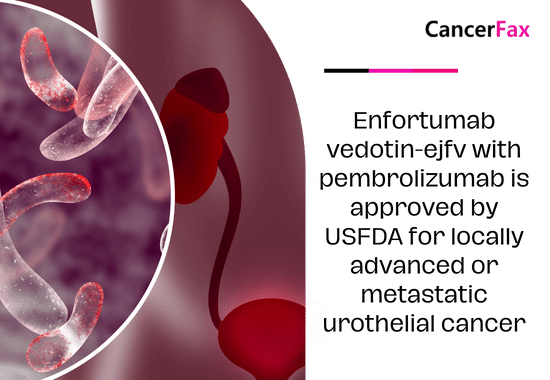As of December 15, 2023, the Food and Drug Administration (FDA) approved enfortumab vedotin-ejfv (Padcev, Astellas Pharma) along with pembrolizumab (Keytruda, Merck) for people who have locally advanced or metastatic urothelial carcinoma (la/mUC). The FDA previously gave rapid approval to this combination for patients with locally advanced or metastatic urothelial carcinoma who cannot receive cisplatin-containing treatment.
The study looked at how well it worked in EV-302/KN-A39 (NCT04223856), a randomized, open-label trial with 886 people who had locally advanced or metastatic urothelial carcinoma and had not had any systemic treatment for advanced illness before. Patients were randomly given either enfortumab vedotin-ejfv with pembrolizumab or platinum-based chemotherapy (gemcitabine with either cisplatin or carboplatin). Randomization was categorized based on cisplatin eligibility, PD-L1 expression, and the existence of liver metastases.
The primary efficacy measures were overall survival (OS) and progression-free survival (PFS) evaluated by an impartial central review team without bias.
Enfortumab vedotin-ejfv plus pembrolizumab showed statistically significant improvements in overall survival (OS) and progression-free survival (PFS) compared to platinum-based treatment. The median overall survival was 31.5 months (95% CI: 25.4, not estimable) for patients treated with enfortumab vedotin-ejfv plus pembrolizumab, and 16.1 months (95% CI: 13.9, 18.3) for those who underwent platinum-based chemotherapy. The hazard ratio was 0.47 (95% CI: 0.38, 0.58) with a p-value of less than 0.0001. The median progression-free survival (PFS) was 12.5 months (95% CI: 10.4, 16.6) for patients treated with enfortumab vedotin-ejfv plus pembrolizumab, and 6.3 months (95% CI: 6.2, 6.5) for those who underwent platinum-based chemotherapy. The hazard ratio (HR) was 0.45 (95% CI: 0.38, 0.54) with a p-value of less than 0.0001.
The most frequent adverse reactions (≥20%) observed in patients treated with enfortumab vedotin-ejfv in combination with pembrolizumab included various laboratory abnormalities such as increased aspartate aminotransferase, increased creatinine, rash, increased glucose, peripheral neuropathy, increased lipase, decreased lymphocytes, increased alanine aminotransferase, decreased hemoglobin, fatigue, decreased sodium, decreased phosphate, decreased albumin, pruritus, diarrhea, alopecia, decreased weight, decreased appetite, increased urate, decreased neutrophils, decreased potassium, dry eye, nausea, constipation, increased potassium, dysgeusia, urinary tract infection, and decreased platelets.
The suggested dosage of enfortumab vedotin-ejfv in combination with pembrolizumab is 1.25 mg/kg (up to 125 mg for patients weighing 100 kg or more) given as an intravenous infusion lasting 30 minutes on Days 1 and 8 of a 21-day cycle until disease progression or intolerable side effects.
The suggested dosage of pembrolizumab when combined with enfortumab vedotin-ejfv is 200 mg given through intravenous infusion every 3 weeks or 400 mg every 6 weeks until disease advancement, intolerable toxicity, or two years of treatment.

Targeting FGFR4 and CD276 with CAR T-cells demonstrates a strong antitumor impact against children rhabdomyosarcoma
Chimeric antigen receptor (CAR) T-cells that specifically target Fibroblast Growth Factor Receptor 4 (FGFR4), a surface tyrosine receptor that is extensively expressed in rhabdomyosarcoma (RMS), are now undergoing clinical research. However, the effectiveness of these CAR T-cells may be hindered by tumor heterogeneity and inadequate activation. In this study, we present a method to enhance the co-stimulatory and targeting characteristics of a FGFR4 CAR through an optimization process. We substituted the hinge and transmembrane domain of CD8 as well as the 4-1BB co-stimulatory domain with the corresponding domains of CD28. The CARs produced exhibit heightened anti-tumor efficacy in multiple RMS xenograft models, with the exception of the RMS559 cell line, which is known for its aggressive nature.

